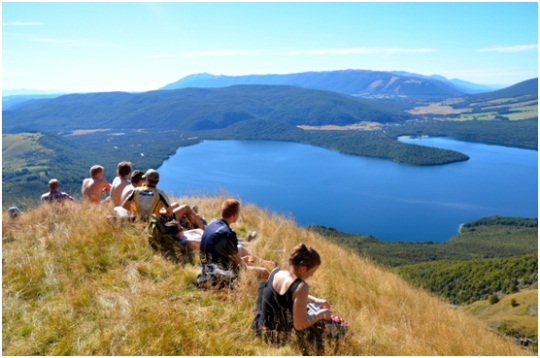Student Field-trip to Nelson Lakes National Park
Imagine participating on an interdisciplinary student fieldtrip in the northern most Southern Alps that offers tranquil beech forest, spectacular mountain scenery and crystal clear lakes.
Imagine participating on an interdisciplinary student fieldtrip in the northern most Southern Alps that offers tranquil beech forest, spectacular mountain scenery and crystal clear lakes. That was the reality for around 140 ENVI/BIOL students recently who embarked this year on one of two 7-day field trips to Nelson Lakes National Park during the Easter mid-semester break.

Picturesque lunch-stop en-route to the top of Mt Robert – all part of the field-trip experience (Photo: BVA).
The aim of the Ecology & the Environment course (ENVI/BIOL-222), jointly coordinated by Kevin Burns (SBS) and Brent Alloway, was to demonstrate relationships between the physical environment and ecosystems in the Nelson Lakes area.
This field-trip was an amalgam between biological and earth science disciplines intended to highlight the intertwined linkages. Here, students were introduced to a stunningly picturesque landscape sculptured by tectonics, Quaternary glaciations and contemporary geomorphic processes while at the same time having easy access to a diversity of forest to alpine flora and fauna. This reflected NZ’s biotic isolation and unique adaptation since the breakup of Gondwanaland.
After going through a series of exercises that familiarise the students with both landscape & biotic elements of the local environment, the students organised themselves into small working groups and embarked on their own research projects– accompanied and supervised of course by staff and teaching associates.
Research project topics ranged from stream/forest invertebrates, bird behaviour and niche partitioning, modified feeding behaviour of long-finned eels, seed dispersion effected by Alpine Wetas, distribution of honey-dew scale insects, forest song-scapes, vegetation patterns across active fans, soil chronosequencing on glacial landforms, Wairau fault mapping and section and/or sediment core paleoenvironmental reconstructions.
At the end of each week, each student group gave a formal 10-minute research presentation that outlined the objectives of their particular study as well as their preliminary results. The general high standard was a testament to the way that the student groups embraced their particular topics.
This field trip will be taking place again in 2013, so interested students will need to enrol in ENVI/BIOL-222 for 2013.
